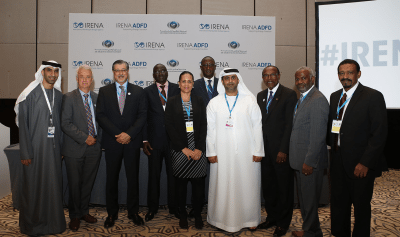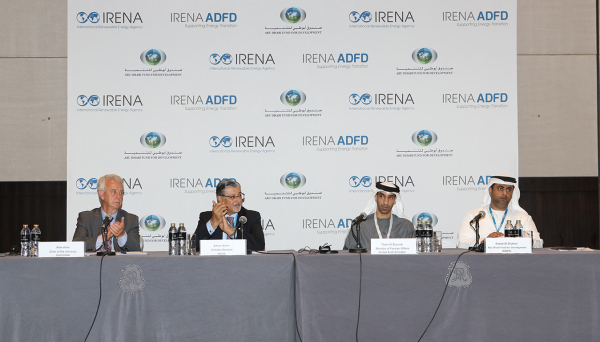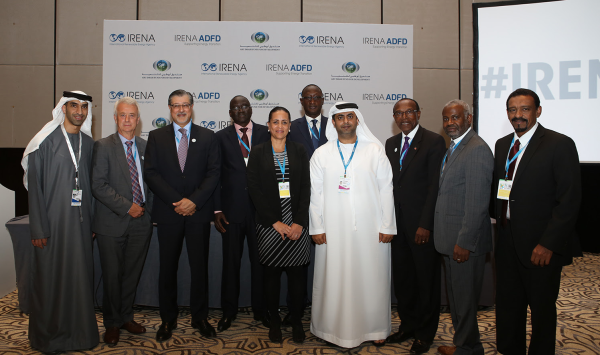

News
$46 Million in Loans Announced for Four Renewable Energy Projects in Africa, Caribbean
The International Renewable Energy Agency (IRENA) and the Abu Dhabi Fund for Development (ADFD) yesterday announced USD 46 million in concessional loans for four renewable energy projects in developing countries. The loans will fund a wind and solar project in Antigua and Barbuda, a solar project in Burkina Faso, a solar and wind project in Cabo Verde and a solar project in Senegal. The four projects will result in nearly 12 megawatts of new renewable energy capacity, reduce emissions, create jobs, and electrify rural communities without access to modern energy services.
“Accelerating the energy transition to renewables requires all countries to take action to develop their own local renewable energy sources,” said IRENA Director-General Adnan Z. Amin at a press conference today on the sidelines of IRENA’s sixth Assembly. “While renewable energy resources are abundant in many developing countries, adequate finance can still be a barrier to deployment. IRENA and ADFD’s pioneering partnership contributes to overcoming this challenge, by selecting innovative projects for concessional funding.”
“Increased availability of clean, affordable and reliable energy is an important priority for ADFD to drive sustainable development and positive societal changes across developing countries,” said Mohammed Saif Al Suwaidi, Director General of ADFD. “Our collaboration with IRENA has significantly contributed to narrowing the energy divide that has long hindered development projects in developing countries due to the lack of reliable power infrastructure. Through this collaboration, we have ensured the availability of necessary financial resources to move the sustainable development agenda forward. At ADFD, we are committed to continuing to collaborate with international agencies to spur economic growth, ensure environmental protection and create jobs across the developing world.”
About the funded projects:
- Antigua and Barbuda: A 4 megawatt wind and solar project will receive USD 15 million to provide energy to desalinate water and increase climate resilience. The project will avoid 8,275 tonnes of CO2 per year.
- Burkina Faso: A 3.6 megawatt solar PV mini-grid project will receive USD 10 million to provide modern energy services to more than 12,000 local families. The project will avoid 2,500 tonnes of CO2 per year.
- Cabo Verde: A 2 megawatt hybrid grid-connected solar PV and wind project will receive USD 8 million to provide a 100 per cent renewable energy solution for the Island of Brava. The project will avoid 4,665 tonnes of CO2 per year.
- Senegal: A 2 megawatt solar PV mini-grid project will receive USD 13 million to supply electricity to rural villages. The project will avoid 3,200 tons of CO2 per year.“Renewable energy plays a major role in sustainable development and, for many developing countries, is the most economically viable energy source,” said Dr. Thani Al Zeyoudi, UAE Permanent Representative to IRENA and Director of Energy and Climate Change at the UAE Ministry of Foreign Affairs. “The ADFD and IRENA partnership enables developing countries to leverage clean energy innovation and reinforces the UAE’s commitment to advance renewable energy development globally.”The fourth funding cycle of the Project Facility is now open for project proposals until 15 February 2016, with concessional loan interest rates of 1-2 per cent provided by ADFD. These low rates will support a broad range of renewable energy projects for the remaining four loan cycles.
- For more information visit: www.irena.org/adfd
- These projects are funded through the IRENA/ADFD Project Facility, which commits USD 350 million to increase the deployment of renewable energy in developing countries. To date, the facility has allocated USD 144 million in project funding over its first three cycles. Loans are provided to finance up to 50 per cent of each project, attracting co-financing from banks, international financial institutions and other development partners. This mobilizes enough funds to more than double the original investment and helps build local financial markets to create valuable know-how for the future.
- Selected projects represent a mix of renewable energy sources, are all innovative, potentially replicable or scalable, and will improve energy access. Previous projects approved for funding in cycles one and two include solar, hydropower, geothermal, biomass, wind and hybrid projects in Argentina, Ecuador, Cuba, Iran, Maldives, Mali, Mauritania, Samoa, Sierra Leone and St. Vincent and the Grenadines.




 Environment12 months ago
Environment12 months agoAre Polymer Banknotes: an Eco-Friendly Trend or a Groundswell?

 Features11 months ago
Features11 months agoEco-Friendly Cryptocurrencies: Sustainable Investment Choices

 Energy11 months ago
Energy11 months agoThe Growing Role of Solar Panels in Ireland’s Energy Future

 Energy12 months ago
Energy12 months agoHow Renewable Energy Can Help Combat Climate Change, According to Indra Energy
















